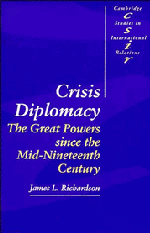Book contents
- Frontmatter
- Contents
- List of tables
- Acknowledgments
- I PART I
- PART II
- 4 The Eastern crisis, 1839–1841
- 5 The Crimean war crisis, 1853–1854
- 6 The Russo-Japanese crisis, 1903–1904
- 7 The Sudeten crisis, 1938
- 8 The Franco-Prussian and Agadir crises
- 9 Pearl Harbor and the Berlin crises
- PART III
- PART IV
- Notes
- Select bibliography
- Index
- CAMBRIDGE STUDIES IN INTERNATIONAL RELATIONS
6 - The Russo-Japanese crisis, 1903–1904
Published online by Cambridge University Press: 03 May 2011
- Frontmatter
- Contents
- List of tables
- Acknowledgments
- I PART I
- PART II
- 4 The Eastern crisis, 1839–1841
- 5 The Crimean war crisis, 1853–1854
- 6 The Russo-Japanese crisis, 1903–1904
- 7 The Sudeten crisis, 1938
- 8 The Franco-Prussian and Agadir crises
- 9 Pearl Harbor and the Berlin crises
- PART III
- PART IV
- Notes
- Select bibliography
- Index
- CAMBRIDGE STUDIES IN INTERNATIONAL RELATIONS
Summary
The crisis between Russia and Japan offers an instructive example of an unfamiliar path to war, but one which may have parallels when established powers are challenged by adversaries not yet accepted as major actors. For the greater part of the crisis the Japanese leadership was preoccupied with the potential casus belli and the other European powers had no doubt that there was a serious risk of war, but until the final weeks the Russians found the idea of a Japanese attack almost unthinkable – a state of mind not unlike the American in 1941 and to a lesser extent in 1950 preceding China's intervention in the Korean war. When the Russian leadership became aware of the danger it began to seek to avert it, but never reached the point of squarely confronting its choices. The war is seen here as stemming from this deep-seated Russian misperception of the seriousness of the Japanese challenge, not from any ‘inevitable’ clash of the two empires. Thus it was an ‘unnecessary’ war, though for quite different reasons than the Crimean.
This interpretation runs counter to the view of the leading UK authority, Ian Nish, that the differences between the two sides over Korea and Manchuria were too great to permit compromise: in effect, Russia would concede a sphere of influence to Japan only if defeated in war. While neither view can be demonstrated conclusively, reasons will be offered for the present interpretation.
- Type
- Chapter
- Information
- Crisis DiplomacyThe Great Powers since the Mid-Nineteenth Century, pp. 106 - 134Publisher: Cambridge University PressPrint publication year: 1994



